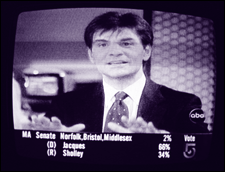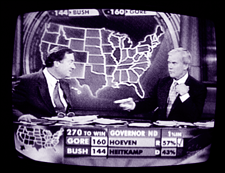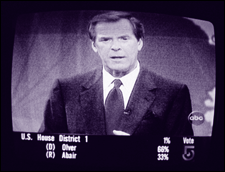The Boston Phoenix November 8, 2000
![[Don't Quote Me]](/standard/image/headers/dont_quote_me_header.gif)
The front page of Wednesday's New York Post - screaming BUSH WINS! - made for a classic DEWEY DEFEATS TRUMAN moment. But on the set of MSNBC, no one was gloating. Brian Williams seemed to show it more as an anthropological curiosity than anything else. And guest-of-the-moment Tom Squitieri, of USA Today, revealed that the only reason his paper hadn't committed a similar boner was that it hadn't had a chance to redo page one during the 90-minute window when it seemed for all the world that George W. Bush was the president-elect. Count on it
The Bush-Gore squeaker was the inevitable result of an artificial, manufactured contest, passively covered by a media too lazy to challenge it
by Dan Kennedy
The Post changed its later editions to read GORE WON'T CONCEDE. Like he should have? As I prepare to file this, at about 8 a.m. on Wednesday, Al Gore has apparently won the popular vote by about 220,000 - roughly double John Kennedy's razor-thin margin in 1960. And Gore may be behind in Florida only because of a ballot screw-up in Palm Beach County, whereby wanna-be Gore supporters voted for Pat Buchanan by mistake.
As became apparent by mid-morning, the Post was hardly the only paper to declare Bush the winner. Locally, the Boston Globe shipped some 22,000 copies of an edition headlined IT'S BUSH IN A TIGHT ONE before pulling back 16,000 and rushing out a revised edition, according to spokesman Rick Gulla; the Boston Herald reportedly ran into a similar problem, but no details were available at press time. Nationally, the Poynter Institute's MediaNews.org was reporting that a number of other papers had done the same thing, including the St. Louis Post-Dispatch, the Austin American-Statesman, and the San Francisco Chronicle. But it really doesn't matter. Because the print press was only memorializing what every television network was proclaiming between 2:28 and 3:50 a.m.: that George W. Bush was the president-elect. Bush believed it. Gore believed it, and was even ready to concede until Bush's Florida lead all but evaporated.
MORE ELECTION COVERAGE Gridlock and its discontents
by Seth Gitell
Gay bashing, Vermont style
by Dorie Clark
The irony of this incredibly dramatic night and morning was that it was just about the only time during this endless campaign that the media have been more than passive observers - and they messed up, big-time. These were, after all, the media's exit polls and projections that everyone was using. No doubt it's a difficult, uncertain science. But instant critics such as Bill Bennett, Karl Rove, and George W. himself had a point when they complained that it's better to get such things right than to get them first. At least some of the pundits seemed suitably chastened, with Tom Brokaw in particular telling his viewers that the media would clearly have to rethink their role.
Oddly enough, the networks' fuzzy math was just about the only interesting aspect of the election-night and next-day coverage. Oh, the drama of it all was exciting, all right. But it was a rather laid-back excitement, as the pundits, usually aggressive to the brink of physical violence, were reduced to exclaiming that, boy, it sure is close. There was, after all, no debate to pick apart. No actual candidates to banter with - a regular, mucho entertaining feature of the presidential primaries (especially when said candidates are exotica such as Steve Forbes or Alan Keyes). There was, instead, the steady drumbeat of numbers, flashing on computerized screens or - on NBC - scrawled illegibly on a white board with a red magic marker by Tim Russert.
In a sense, though, the media's constricted role was a metaphor for their performance in the entire campaign. The Democratic and Republican establishments designed a nominating process aimed at getting exactly what they wanted: comfortable, predictable, centrist candidates, the sort of people who could raise the tons of money needed to compete in an early, insanely foreshortened primary season. No George McGoverns or Jimmy Carters, thank you very much. From the moment the midterm election results were counted in November 1998, the party elders decided they wanted a nice, safe Gore-Bush race. And, despite a few weeks of excitement courtesy of John McCain and Bill Bradley, that's exactly what they got. The public's role was to sit back and take it; the media's, to focus on ephemera (Bush's brainpower or lack thereof, Gore's propensity to exaggerate), campaign strategy, or - when they went into eat-your-spinach mode - mind-numbing explications of the candidates' differences on prescription-drug benefits for the elderly.
Tom Patterson, director of the Vanishing Voter Project at Harvard's Kennedy School, spent more than a year tracking voter interest in the campaign - only to conclude that the voters had little to do with it. In an op-ed piece in the New York Times on Wednesday, Patterson wrote that the project's polling revealed most voters think presidential campaigns start too early and last too long. And they're right, Patterson argued, writing that "the financial and organizational advantages of George W. Bush and Al Gore enabled them to eliminate their opponents before voters in more than 30 states had even had a chance to cast a ballot. No wonder 74 percent of Americans concluded at that time that party leaders and large contributors have a larger voice than the voters in the election of the nominees."
The media should focus considerable attention on the systemic failures documented by Patterson. Unfortunately, mainstream journalism, motivated by convention and sloth, is far better equipped to cover the charges and countercharges of the campaign trail than it is to bring sustained attention to bear on the way we select and elect presidents.
Ralph Nader - to many progressives, the embodiment of an alternative to the manufactured Gore-Bush race - turned out to be a spectacular failure on two entirely different levels. He fell way short of the five percent he needed for the Green Party to qualify for federal matching funds. Yet because the main event was so close, the few votes Nader did receive were enough to do serious damage to Gore, presumably the second choice of most Nader voters. Indeed, Nader's Florida vote greatly exceeded Bush's tenuous margin, meaning Nader might have cost Gore the election right there.
To the extent that Nader thrived, he did so by exploiting the fiction that there is little difference between the two major parties. While it's true that the ideological fires of earlier eras have largely burned themselves out, the Democrats remain, broadly speaking, the liberal party, and the Republicans remain the conservative party. In almost every conceivable way - on tax fairness, gun control, the environment, reproductive choice, gay rights, health care, and more - the Democrats hold positions that are infinitely more progressive than those of the Republicans.
Certainly most Americans figured that out on Tuesday. According to exit-poll numbers posted on CNN.com, Democrats supported Gore by 86 percent to 11 percent, and Republicans were with Bush by 91 percent to eight percent. African-Americans supported Gore by 90 percent to eight percent; lesbians and gay men were with Gore by 71 percent to 24 percent; voters earning less than $50,000 were with Gore, and those earning more than that were with Bush. In other words, engaged voters understood the differences between the two parties and voted accordingly. As David Broder wrote in the Washington Post on Wednesday, "It was as if two different nations went to vote yesterday - men vs. women, big cities vs. small towns, large states vs. small, splitting their votes between Republicans and Democrats so evenly that the government of their one country, the most powerful nation in the world, hung in the balance."
But it was a cliffhanger not because of these committed voters, but because of the independents - those uninterested, undecided-until-the-last-minute voters who don't want to hear a blatant party appeal, and to whom Gore and Bush both narrowly targeted much of their campaign. (See "Gridlock and Its Discontents,")
To be sure, there was much that was beyond Gore's control. The exit polls showed that 60 percent of voters dislike Bill Clinton as a person, and 20 percent said their vote was intended at least in part as a slap at Clinton. Focus groups of undecided voters also showed that Gore was punished for being too aggressive in his debates against Bush, even though Bush came off as uninformed and defensive in two of their three encounters. Independents on Tuesday supported Bush by 47 percent to 45 percent (and they were the only group to give Nader some meaningful numbers, with six percent). Go figure.
But, ultimately, the race was Gore's to lose, and - pending the Florida recount - that's exactly what he may have done. I don't think it's his smartest-boy-in-the-class syndrome, cited by so many pundits, although that's part of it. Mainly, it's his overweening ambition, the sense that there is nothing he wouldn't say or do or promise in order to win. Witness a horrifying AP photo, posted on Salon, of him trying to re-enact The Kiss outside a Tennessee voting booth. Tipper seems natural enough; but Gore, open-mouthed and slack-jawed, looks like he can't decide whether to slobber all over her or bite her. A slicker politician, like the master, Bill Clinton, would know that lightning only strikes once, and therefore each kiss brings with it diminishing returns.
The trouble is, Gore's calculated moments invariably come off as over-scripted, and thus always telegraph their grasping, politically motivated intent. That's why his lies about himself have been so much more politically damaging than Bush's much worse lies about his own record and his proposals. Although Bush's alleged likableness escapes me, I have no problem understanding why many people don't like Gore. As Joe Klein put it in the New Yorker last week: "There is a sad, graceless desperation to Al Gore, a quality that has slowly, almost subliminally been communicated to the electorate in the course of the campaign - and this is the real reason, I suspect, that he has suffered at the polls." Who knows? Maybe, despite all his faults and his Clintonian baggage and his pandering, Gore will still wind up as president. The fact remains, however, that it never should have been this hard. Running on a record of peace and prosperity, against an opponent who thinks "misunderestimated" is a word, Gore now finds his political future hanging by a thin thread.
Al Gore, who couldn't make voters like him, isn't going to change if he becomes president - especially since, if he does win, it will be by one of the narrowest margins ever. The essence of the modern presidency is the ability to communicate effortlessly, to explain and to exhort and to inspire. Ronald Reagan had it. Bill Clinton has it. Gore doesn't. That's why, even if Gore wins, the next four years are going to be so painful.
No, the media didn't get it right on Tuesday night or Wednesday morning. But those errors pale when compared with their performance over the past two years. By covering the Gore-Bush race as if it were the inevitable result of forces beyond anyone's control - rather than a contrivance foisted on the public by the two major-party establishments - they failed in some pretty crucial and fundamental ways.
Dan Kennedy's work can be accessed from his Web site: http://www.dankennedy.net
Dan Kennedy can be reached at dkennedy[a]phx.com
Articles from July 24, 1997 & before can be accessed here



